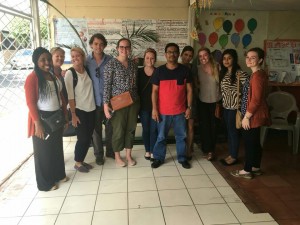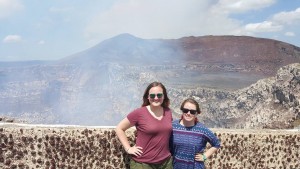On Saturday morning, the group had an emotional departure from León and our host families. After a quick lunch and recoup period, we headed out to meet Julio Cesar Mena, the Executive Director of an organization working on HIV/AIDS prevention, education, and human rights in Nicaragua. He first gave us a quick rundown of the climate of HIV/AIDS in Nicaragua and the stigma around the disease in his community. Julio also shared his personal testimony about how he contracted HIV and his struggles with the disease since.
During the Nicaragua revolution in the 1980s, Julio was a 17 year old soldier in the military. He was severely wounded and dying when a friend gave him a blood transfusion to save his life. In the early 1990s, he tried to donate blood at Red Cross when they denied him and sent him home. Later, men came in hazmat suits to his home and carried him out on a stretcher, tied down. Julio mentioned that he vividly remembers all the neighbors coming outside to watch. It was obvious to them that something was wrong. That was the beginning of his constant struggle with the disease and the stigma associated with it.
It was Valentine’s Day. He was sitting alone in a hospital room when he asked a nurse for water. She came back with a disposable cup and the doctor followed her in. When the doctor came in the room, he told Julio to sit across the room and not come near him. That was when the doctor told him he was HIV positive and only had 5 years to live.
He was taking 90 pills a day. 30 at each meal.
He could no longer find a job.
His daughter ended up being infected and dying from liver failure.
She died while he was holding her in his arms.
His wife left him and moved to Miami.
He became an alcoholic and drank for 3 months straight.
He was hospitalized and in a coma for 12 days. He left the hospital weighing 60 lbs.
His family started planning his funeral.
They stored his coffin under his bed and ordered all the food.
The family served him meat for every dinner and spoiled him.
No body had any faith he would survive.
The night before the 5 year mark, he thought he would die in his sleep. The next morning, he was afraid to open his eyes because he was sure he had died. When he heard the roosters crow, he asked himself “Are there roosters in Heaven?” Then he finally realized he was still alive and he had new found hope.
It took him a while to realize how he had even contracted HIV. The common myth is that it is through sexual contact rather than drugs or anything else in Nicaragua. He recalled his family asking him first if he was gay or a sex worker. When he realized it was his friend from the war, he immediately wanted to find and kill him. He found an address for him in León. He went there only to find the man’s mother. She told him he had moved to Honduras for good. When Julio asked her to call him and tell him that he was there and needed to warn him about having HIV, the mother instantly began crying. Her son had died in Honduras from symptoms related to the disease. That was satisfaction enough for Julio.
After that, he began this organization to educate others and prevent the further spread of HIV. Today he is married and has another daughter. He now only takes 16 pills a day and has a better reason to wake up every morning. Through the organization, they have been able to test hundreds of thousands of people throughout the country. They provide education and other resources to communities at greater risk and were even able to prevent the further spread of the disease in a smaller community when one person came forward. He has built incredible relationships through his organization and his life has great purpose. You could tell that what he does now, because of his experiences, has made a huge impact in the uncountable lives of Nicaraguan people.
Take away thoughts form this experience:
1. Take a moment to know to people’s story. We never know what someone has struggled through and it is important to always take that into consideration before judging them.
2. Do your research and know your facts. Even the doctor was nervous about being close to Julio due to misunderstood myths about HIV/AIDS. It’s important to consider their feelings and show love to everyone despite, and especially be share, of their struggles.
3. Don’t fall victim to the stigmas and stereotypes around you. Specifically, do all that you can to counter them and dismantle them in your society.
4. Even through hard times, find a reason to wake up in the morning. Don’t let the world get the best of you. Use your struggles, learn from them, and make the world a better place because of them.
5. Be strong. Never lose hope.

